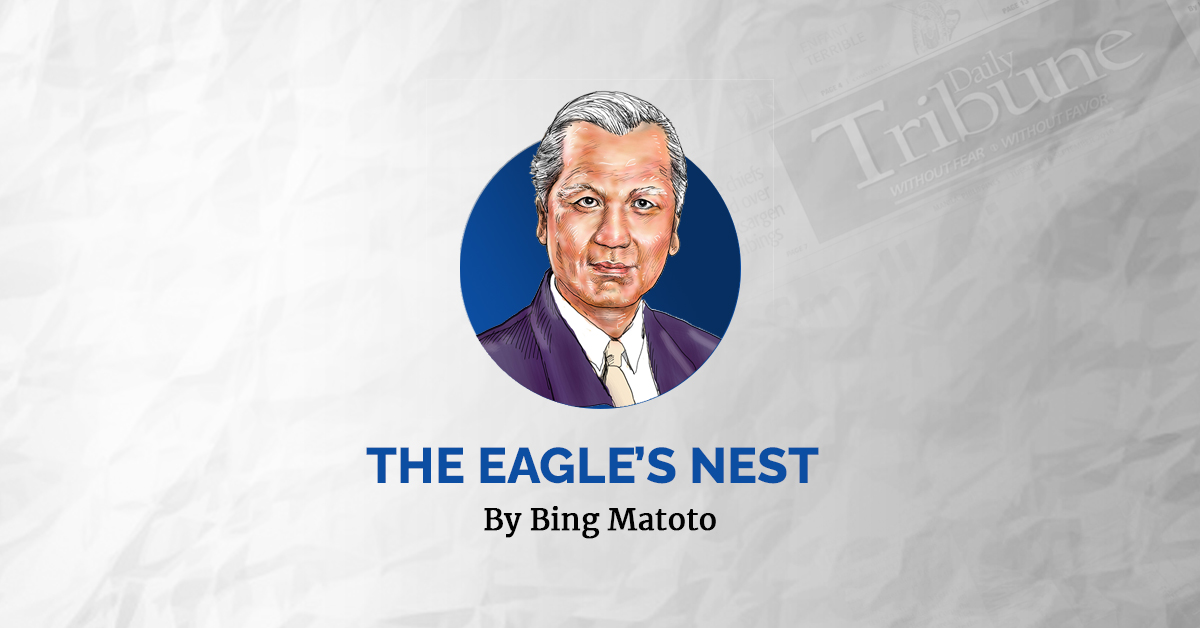The ink of BBM’s signature on the law creating the Maharlika Investment Corporation, or MIC, is now dry, and the Implementing Rules and Regulations have been issued. But still, the criticisms continue unabated from Pinoy kibitzers, i.e., management experts, private economic think tanks, to the top echelons of leading business organizations.
Over the weekend, as the MIC’s partial start-up capital was remitted to the National Treasury, a leading periodical (not DAILY TRIBUNE) headlined the claim of the leadership of DBP, Michael de Jesus, that “gains from MIC’s trailblazing activities” will surely be forthcoming by the end of BBM’s term.
Yet beneath the headline of the same broadsheet was a reference to well-regarded businessman George Barcelon, PCCI president and an esteemed fellow member of the Rotary Club of Makati, who said the MIC should have first finalized its board and management line-ups before DBP and Landbank made any contributions.
Further, during the Institute of Corporate Directors-sponsored talk on the MIC of Dr. Bernardo Villegas last week, several ICD fellow members raised questions to Doc Bernie and the panel composed of yours truly and fellow governance advocate Francisco del Rosario.
Not only that, several friends in my Upsilon Sigma Phi and AIM chat groups, who count among them several well-informed, leading management and business lights of our country, had concerns and comments about the MIC.
Given this apparent continuing widespread interest from people whom I have great respect for and who certainly have only the best interest of the country in mind in voicing their observations, I would like to give it a shot and share what I believe are the key issues that are perennially raised and my own reactions to these comments.
Do we need another GOCC when other agencies and GOCCs are in place? There is a frequent reference to NDC, a GOCC under the DTI with a long history of hits and misses. It has historically ventured into businesses that the private sector would generally not be interested in but nevertheless deemed important for the country’s economic development.
However, saddled with relatively modest capital and some under- and non-performing assets on its balance sheet, NDC has never really figured in any blockbuster transactions or has high-potential assets that could catch the interest of multilateral or global venture funds.
The bottom line, surely prospective foreign investors would rather partner with a GOCC that has a clean balance sheet, significant capital, is manned by leading management and investment experts, and is supported by a board composed of the highest economic agencies in the country.
Mandating LandBank and DBP to invest P75 billion in the MIC will deprive other borrowers needing credit, such as farmers and MSMEs. Indeed, it will theoretically reduce their loanable funds to this extent. However, a cursory look at LandBank’s latest published financial statements will indicate that loans and receivables are only at about 30 percent of total assets, suggesting that they are underlending relative to their lending capacity.
In fact, during the Senate hearings on MIC, I recall the bank officials disclosing that almost 90 percent of their liquidity is invested in government securities. Why this is so is another story. Furthermore, other than BSP regulatory constraints, these GFIs are not geared, philosophically and organizationally, to be investing in equity, particularly of long-term duration, i.e., non-allied undertakings such as infrastructure or the agriculture sector, which are expected to be the MIC’s target investee industries.
MIC will bypass the budget and appropriations process, reducing the government’s resources that could otherwise have been made available for the country’s other needs. Yes, MIC will bypass the budget and appropriation process because perhaps that was the whole intention.
But as noted by Dr. Villegas in his ICD talk, with our current deficit, the national budget is intended for the country’s pressing operating needs. In contrast, the long-term capital funding required for infra and the like is precisely the funding gap that MIC could fill through joint ventures with foreign investors.
Until next week… OBF!
***
For comments, email bing_matoto@yahoo.com.
(To be continued)
